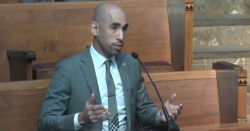
Ray Nosworthy, Buffalo’s new acting finance commissioner, had a rough first day on the job.
His first task Tuesday morning was to tell the Common Council’s Finance Committee that, one quarter into its financial year, the city was staring at a nearly $18 million deficit. He also told lawmakers that Acting Mayor Chris Scanlon is demanding 10 percent cuts in expenditures from all city department heads in next year’s budget.
Nosworthy said the “unexpected” $18 million deficit was the result of the city’s depleted savings.
The Council in June adopted a spending plan that had a $40 million imbalance between operating costs and regular revenues — property taxes, sales tax, state aid, fines and fees, and the like. To fill that gap, then-Mayor Byron Brown and the Council planned to use $25 million in federal pandemic relief money and $15 million in reserve funds.
As it turns out, Nosworthy told lawmakers, the $15 million in reserves is already gone. The city was forced to use that money to balance the books on the last fiscal year, which ended June 30.
The unexpected shortfall was driven at least in part by runaway overtime costs, especially in the police and fire departments. Last year the city spent $41 million on overtime, according to the city comptroller. That was $22 million over budget.
There are no more reserves left for plugging deficits, Nosworthy told the Council.
The loss of those reserves, plus the continuing problem of police and fire overtime costs exceeding the budget, led to a projected $17.86 million deficit in the current budget year, per the finance department’s analysis of revenues and expenditures from July 1 through Sep. 30.
Nosworthy allowed that such a big deficit so early in the year “might sound alarming,” but noted that the imbalance was almost entirely due to the “unexpected absence of fund balance,” which is the term municipal accountants use for savings.
“Not having that money is the main driver of this deficit projection,” he told the Finance Committee.
Nosworthy became acting finance commissioner on Monday, when his former boss, Delano Dowell, resigned the post. Dowell is returning to his previous position as deputy to city Comptroller Barbara Miller-Williams.
Dowell has changed jobs three times in five years, ping-ponging between former Mayor Byron Brown’s administration and the comptroller’s office. He was a top aide to Donna Estrich, Brown’s former finance commissioner. He joined Miller-Williams in the comptroller’s office in 2019, first as a special assistant, then as deputy comptroller. When Estrich retired in 2022, Brown hired him back into his administration to succeed her.
Dowell’s resignation, first reported by WBFO, is effective Dec. 16. Once back in the comptroller’s office, his duties will include watchdogging the city’s adherence to a budget that he was instrumental in creating.
Nosworthy told the Finance Committee he believed the city would be able to close that $18 million deficit in the months to come, in part through controlling expenditures. That includes what amounts to a soft hiring freeze: Vacant positions in City Hall are unlikely to be filled this year, even if money has been allocated for them, unless those jobs produce revenue for the city.
In addition, Nosworthy said, the administration of Acting Mayor Chris Scanlon — who succeeded Brown in October — likely would sweep more federal pandemic relief money into the city’s general fund, where it can be used to plug holes in the budget.
Content retrieved from: https://www.investigativepost.org/2024/12/04/buffalos-financial-hole-gets-deeper/.





